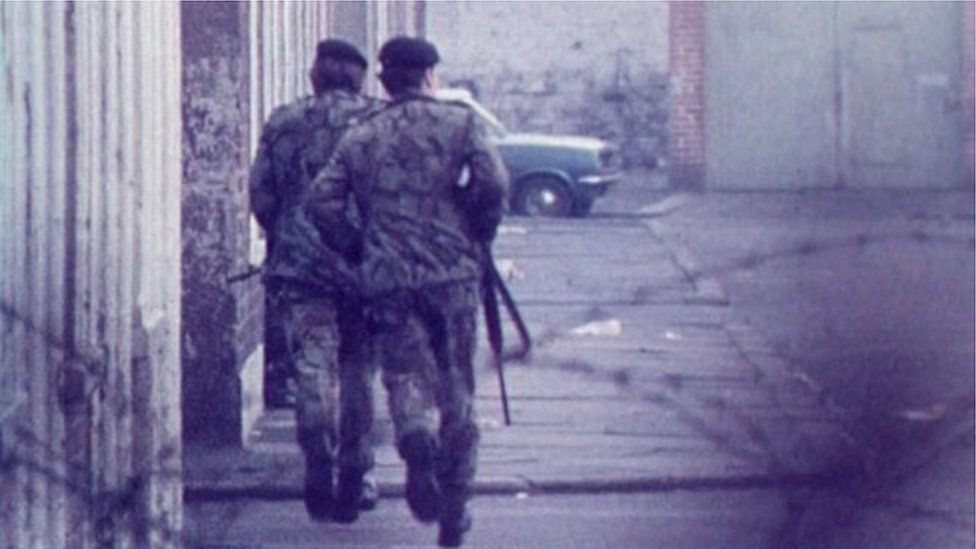NI Troubles: Amnesty plans may have truth recovery condition
- Published

An amnesty from Troubles prosecutions could be conditional upon cooperation with truth recovery investigations, the government has revealed.
This would change a key aspect of plans to deal with the conflict's legacy.
Details are contained in a paper published after the Queen's Speech on new legislation.
Ministers aim to pass the Northern Ireland Troubles (Legacy and Reconciliation) Bill in the coming months.
The Queen's Speech, which was delivered by the Prince of Wales on Tuesday, is used to set out plans for new laws.
The address also included plans for the Identity and Language (Northern Ireland) Bill, which commits to delivering on commitments about identity and language negotiated in the New Decade, New Approach agreement of 2020.
This gives recognition and protection to the Irish language and will enhance and develop the Ulster Scots/Ulster British tradition.
"This will recognise and celebrate Northern Ireland's natural and cultural identities and accommodate cultural differences," the statement continued.
It includes the creation of a new office of identity and cultural expression and two commissioners to be appointed by the first and deputy first ministers.
Although not outlined in the papers which accompanied the Queen's Speech, the government has also modified its position on banning all Troubles-related civil cases and inquests.
It is understood existing claims could continue to a conclusion, as would any inquests which have started by the time the legislation comes into effect.
It is not yet clear when the draft legislation will be introduced into Parliament, or what start date the government has in mind for the new arrangements to come into force.
Speaking after the speech, the DUP leader Sir Jeffrey Donaldson, whose party had been opposed to the original amnesty plans, said he would have to wait to see the contents of the bill.
"I am not sure it will reflect the initial proposals," he told BBC News NI.
"I want to see does it offer the chance for innocent victims to see those who perpetrated their murderous deeds against loved ones prosecuted?
"What does the process look like? Are we talking about a blanket statute of limitations?" he asked.
"We are clear and always have been that justice must not be sacrificed," he added.
"The innocent victims families have waited for years, some for decades for the opportunity to have justice brought and they have the right to pursue that.
"We will judge what the government proposes against whether the opportunity for justice remains," he added.
Asked whether he would accept a conditional statute of limitations he said he would have to see the detail of such a plan.
"We must not allow a situation to develop where people are able to rewrite the narrative which suggests that terrorists which committed terrible atrocities across the board are somehow either exonerated or can walk away," he said.
"That is not what the people of Northern Ireland want. They want truth but they also want justice," he added.
It will be a day remembered for who wasn't there and, for unionists, what wasn't included in the government's legislative plan.
There was no mention of the much talked about legislation to over ride parts of the Northern Ireland protocol.
Instead, buried deep in the Executive summary was a vague reference to protecting the the UK's internal "economic bonds".
The government steered cleared of any legislative commitment around the protocol, much to the frustration of the DUP.
The party says it needs actions and not words.
Away from the pomp and ceremony, the state opening of Parliament allows the government to press the reset button at Westminster but there is no sign of a reboot at Stormont anytime soon.
'Protocol needs to change'
Northern Ireland is currently without a first or deputy first minister because the Democratic Unionist Party (DUP) has refused to nominate to the joint office as part of its protest against the Northern Ireland Protocol.
The protocol is the part of the UK's Brexit deal with the European Union, which retains free trade across the Irish border but introduced checks on some goods moving across the Irish Sea from the UK to Northern Ireland.
The DUP has said it will not go back into government in Northern Ireland until its concerns over these post-Brexit trading arrangements are resolved.
The Queen's Speech referenced the protocol and said it "needs to change".
"We urge our partners in the EU to work with us, with new imagination and flexibility, to deliver that," it outlined.
"We will continue to talk with the EU but we will not let that stand in the way of protecting peace and stability in Northern Ireland."
Widespread opposition to amnesty
Legislation on the controversial amnesty proposals have been held up by about six months as the government continues to engage with parties and victims' groups.
The plans emerged last July when the government proposed "drawing a line under the Troubles" by banning any more prosecutions.
This would cover all Troubles-related incidents involving paramilitary organisations as well as the police and Army.
But the idea has faced widespread opposition in Northern Ireland.
Instead of prosecutions, inquests and civil cases, the government has suggested a truth recovery process for bereaved families, including a level of disclosure by the state "that has never happened before".
In recent months, it has been examining how to make truth recovery a more robust investigative process.
The government has come under mounting pressure from its own back benches to act quicker in order to prevent any further prosecutions of former soldiers.
The Public Prosecution Service (PPS) has yet to make decisions on 12 veterans as part of a wider legacy caseload.
There are also about 1,200 unsolved Troubles-related killings currently with the Police Service of Northern Ireland (PSNI), which would take 20 years to work through.
Related Topics
- Published2 January 2022
- Published27 October 2021
- Published20 July 2021
- Published14 July 2021
- Published10 May 2022
- Published8 May 2022